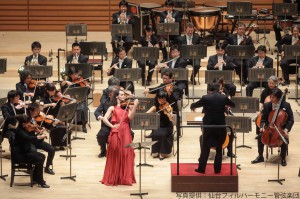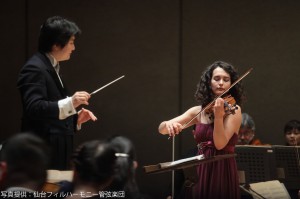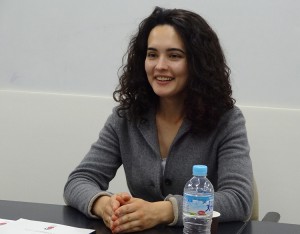Interviews
Interview with Ms. Alena BAEVA
1st Prizewinner of the Violin Section at the 3rd SIMC
Interviewed by: KATAGIRI Takuya (Music Writer)
interviewed : 20140517

Alena BAEVA won the 1st prize in the Violin Section at the 3rd Sendai International Music Competition (SIMC) held in 2007. Since the Competition, she has been performing actively all over Europe. In February 2014, she performed Shostakovich’s Violin Concerto No. 2 with Russian maestro Valery Gergiev and the Mariinsky Orchestra in Salle Pleyel in Paris. She has been actively performing in many solo recitals and chamber music concerts. In May of this year, she visited Sendai for the first time in a long while, to perform at the 282nd subscription concert of the Sendai Philharmonic Orchestra. Taking this opportunity, I interviewed her to ask about her current activities, her memories of Sendai, and her message to young musicians who are hoping to participate in SIMC in the future.

You performed in Sendai after a long absence. How did you feel?
The audience in Sendai always gives me a warm welcome, listening very attentively to my performance. This impression of mine hasn’t changed since I played at the Competition.
I think that this was the first time for you to play in the Hitachi Systems Hall Sendai (Sendai City Youth Cultural Center) since the Great East Japan Earthquake. The Hall was renovated in the summer of 2012. How did you feel about the Hall?
Compared to the time of the Competition, I felt that the acoustics in the Hall were even better. At any rate, I was so impressed to see people working together, united as one to overcome all difficulties following such a devastating disaster. I felt it was really amazing.
I’ve heard that when you came to Japan to play with Yuri Bashmet and Moscow Soloists shortly after the Earthquake (in May 2011), you rushed over to Sendai and played on the street.
I felt strongly that I had to do something for the people of Sendai, so it was just the natural thing for me to do.
By the way, this time you played with the Sendai Philharmonic Orchestra. I’ve heard that you and Maestro YAMADA Kazuki have known each other for some time.
Yes, I first met Maestro YAMADA at the Seiji Ozawa International Academy Switzerland. At the Academy, students perform chamber music and in an orchestra. Maestro YAMADA was in charge of conducting the orchestra at the Academy. It may be said that our meeting there has led to our performing together in Sendai this time. Maestro YAMADA is a wonderful conductor and we both say we would like to play together again.

When did you first participate at the Seiji Ozawa Academy?
As I recall, it was in the summer of 2007. Since then, I have participated every year. When we played Tchaikovsky’s Serenade for Strings under the direction of Maestro OZAWA, I performed as concertmistress. It was a fascinating experience.
So, a lot of things happened in 2007, didn’t they? You won the 1st prize at the Competition in Sendai and also met Maestro OZAWA for the first time.
Looking back now, yes, they surely did. Come to think of it, it was also in 2007 when I first played with Vadym KHOLODENKO at a recital. I came to play with him after being introduced to him by a teacher of the Moscow Tchaikovsky Conservatoire.
Mr. KHOLODENKO also won 1st prize at the SIMC (2010). After that, he won the gold medal at the Van Cliburn International Piano Competition. He has been making a spectacular success.
He is now performing mainly in the United States, but I still play with him at recitals, so we are keeping in contact.
Past Contestants of SIMC are now very active around the world. Mr. Andreas JANKE, the 4th Prizewinner of the 2nd SIMC Violin Section, is now a concertmaster of Tonhalle Orchester Zurich.
Ms. Erin KEEFE, who won the 2nd prize of the Violin Section of the 2007 SIMC, has also become the concertmistress of the Minnesota Orchestra in the U.S. I am still interested in the activities of people who participated in the Competition together with me.
I want to ask you something about which I was made curious this time. When you were playing with Maestro Gergiev and also when you were playing with Sendai Philharmonic Orchestra, both times you had the music score in front of you and you were playing while looking at it. Is there any special reason for that?
I perfectly memorize the musical score of the piece I will play, so basically I don’t need it. But while playing, I sometimes feel I want to know what is “happening” there or to confirm the instructions written there. So I always have the score close by. It’s not because I’m worried about my memory.
One more extra question. Maestro Gergiev sometimes conducts using a very short stick as a baton, doesn’t he?
Yes. When I was playing with him, he was also conducting with a very short, thin stick, like a traditional Japanese toothpick. I’ve heard from orchestra members that he uses longer and longer batons, though. I have never asked Maestro the reason, but personally I feel that he uses a very short stick when he wants to make the orchestra members focus their attention more on the conducting.
Thank you very much. By the way, the 6th SIMC will be held in 2016. Do you have any advice for people who are planning to participate in the Competition?
I think the most important thing is to enjoy the competition. When you participate in a competition, you will get some results, but you should try to enjoy playing, without worrying too much about the results from the beginning. On the contrary, you should spend a lot of time preparing for the competition. Preparation is the most important part. If you have good preparation, then you will be able to deliver a good performance at the competition.

What do you think is the charm of the Competition in Sendai?
I was impressed with the rich nature of Sendai, the efficient and kind care of the Secretariat staff and volunteers, and how it was so well organized. I also vividly remember the warmth of the large audience in the hall.
My first visit to Japan was when I participated in SIMC in 2007. After arriving in Sendai, I went to a sushi restaurant near the hotel as many as three times a day. What impressed me most at first was Japanese food. Since then, my interest in Japanese food has grown, and I have become particularly interested in Matcha (powdered green tea). But unfortunately, we cannot get Matcha easily in Russia. I love Matcha-flavored ice cream too, but we cannot find it in Europe. I have been looking for Matcha-flavored ice cream in various cities, but I cannot find any. That’s a real shame.
Let me ask you about your future schedule. In addition to many concerts, you will be on the jury for the Concours International Marguerite-Long-Jacques-Thibaud (Paris), which will take place this autumn, won’t you?
Yes, this will be my first experience to serve as a competition judge.
Serving as competition judge can be a tough job, but I’m sure you will be able to find a Matcha-flavored ice cream in Paris. Because there are many stores dealing in Japanese food products out there.
I’ll look for Matcha-flavored ice cream when I go to Paris. Thank you!
I interviewed Ms. BAEVA for the first time since I interviewed her right after her win in the Competition. Her positive and professional attitude of trying to answer all the questions has not changed at all since seven years ago. She is a busy violinist and at the same time a mother. I am sure that she will further develop as a musician while continuing her performance activities all over the world.


